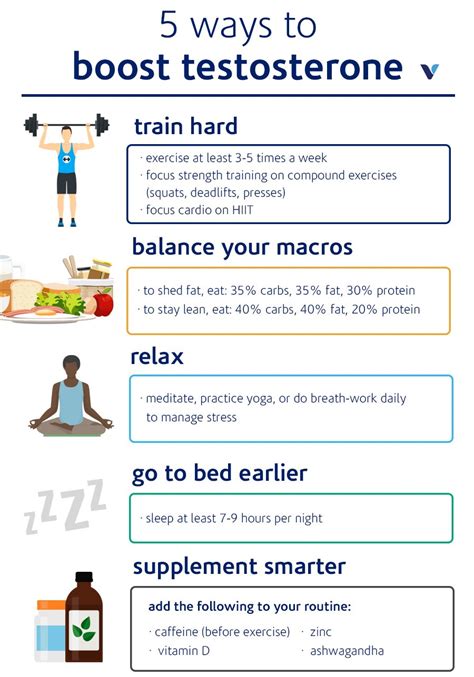How to naturally raise testosterone for improved strength & drive?

Understanding Testosterone’s Vital Role
Testosterone, often hailed as the cornerstone of male vitality, plays a crucial role far beyond just sex drive and muscle mass. This powerful hormone influences everything from bone density and red blood cell production to mood, cognitive function, and energy levels. While testosterone levels naturally decline with age, modern lifestyle factors can accelerate this drop, leading to symptoms like decreased strength, persistent fatigue, reduced libido, and even a dip in motivation and mood. Fortunately, several evidence-based natural strategies can help optimize your body’s testosterone production, empowering you to reclaim your strength and drive.
Instead of turning immediately to synthetic solutions, a holistic approach focusing on diet, exercise, sleep, and stress management can yield significant, sustainable results. By understanding how these lifestyle pillars interact with your endocrine system, you can create an environment where your body naturally thrives and produces testosterone more efficiently.

Optimize Your Workouts: Lift Heavy, Move Fast
Exercise is one of the most potent natural testosterone boosters. However, not all workouts are created equal for this purpose. The most effective strategies involve resistance training and high-intensity interval training (HIIT).
- Strength Training: Compound exercises that engage large muscle groups (squats, deadlifts, bench presses, rows) have been shown to elicit the greatest testosterone response. Aim for heavier weights with fewer repetitions (e.g., 3-5 sets of 5-8 reps) to stimulate maximum hormonal output.
- High-Intensity Interval Training (HIIT): Short bursts of intense activity followed by brief recovery periods can significantly increase testosterone levels. Think sprints, burpees, or cycling at maximum effort. Integrate 2-3 HIIT sessions per week, ensuring adequate recovery.
Avoid excessive long-duration cardio, as this can sometimes lead to increased cortisol (a stress hormone that can suppress testosterone) and potentially dampen the testosterone-boosting effects of other exercise types.
Fuel Your Body: A Testosterone-Boosting Diet
What you eat directly impacts your hormonal health. A diet rich in specific nutrients and balanced macronutrients is critical for optimal testosterone production.
- Healthy Fats: Cholesterol is a precursor to testosterone, so consuming adequate healthy fats is essential. Include sources like avocados, olive oil, nuts, seeds, and fatty fish (salmon, mackerel). Aim for roughly 20-30% of your daily calories from healthy fats.
- Quality Protein: Adequate protein intake supports muscle growth and recovery, which indirectly aids testosterone levels. Focus on lean meats, poultry, fish, eggs, and plant-based protein sources.
- Crucial Micronutrients: Zinc, Vitamin D, and Magnesium are particularly important. Red meat, shellfish, and legumes are rich in zinc. Sunlight exposure is the best source of Vitamin D, but fatty fish and fortified foods also provide it. Dark leafy greens, nuts, and seeds are excellent sources of magnesium.
- Limit Processed Foods and Sugar: These can contribute to inflammation and insulin resistance, both of which negatively impact testosterone. Minimize alcohol consumption, as excessive intake can also suppress testosterone.

The Crucial Role of Sleep and Stress Management
Poor sleep and chronic stress are two of the biggest silent assassins of testosterone. Prioritizing these areas can dramatically improve your hormonal profile.
- Quality Sleep: Testosterone production largely occurs during deep sleep cycles. Aim for 7-9 hours of high-quality sleep per night. Establish a consistent sleep schedule, create a dark and cool sleep environment, and avoid screens before bed. Even a single night of sleep deprivation can significantly reduce testosterone levels.
- Stress Management: Chronic stress elevates cortisol levels. When cortisol is high, testosterone tends to be low, as the body prioritizes survival over reproduction. Incorporate stress-reducing practices into your daily routine, such as meditation, yoga, deep breathing exercises, spending time in nature, or engaging in hobbies you enjoy.

Lifestyle Hacks for Hormonal Balance
Beyond the core pillars, several lifestyle adjustments can further support healthy testosterone levels.
- Maintain a Healthy Weight: Excess body fat, particularly around the abdomen, can lead to increased estrogen production and lower testosterone. Losing weight, if you’re overweight or obese, is one of the most effective ways to boost testosterone naturally.
- Get Sunlight Exposure: Regular, safe sun exposure helps your body produce Vitamin D, which is directly linked to testosterone levels. Aim for 15-30 minutes of direct sunlight a few times a week, when appropriate.
- Avoid Endocrine Disruptors: Certain chemicals found in plastics (BPA), personal care products (phthalates, parabens), and pesticides can mimic or interfere with hormones. Opt for glass containers, choose natural personal care products, and eat organic when possible to minimize exposure.

Consider Smart Supplementation (When Necessary)
While diet and lifestyle are paramount, certain supplements can offer additional support, especially if you have deficiencies or specific needs. Always consult with a healthcare professional before starting any new supplement regimen.
- Vitamin D3: If your levels are low, supplementing with Vitamin D3 (in consultation with your doctor) can be highly beneficial.
- Zinc: If you’re deficient, zinc supplementation can restore levels and support testosterone.
- Magnesium: Important for overall hormonal health and can improve sleep quality.
- Herbal Extracts: Some herbs like Ashwagandha and Fenugreek have shown promise in clinical studies for supporting testosterone levels and reducing stress.
Embrace a Holistic Approach for Lasting Results
Naturally raising testosterone for improved strength and drive isn’t about quick fixes; it’s about adopting a sustainable, holistic lifestyle. By consistently prioritizing intense exercise, a nutrient-dense diet, adequate sleep, and effective stress management, you create the optimal environment for your body to produce and regulate this vital hormone. The benefits extend beyond just physical improvements, encompassing enhanced mood, sharper cognition, and an overall greater sense of vitality and well-being. Start making these changes today, and you’ll be well on your way to a stronger, more driven you.










